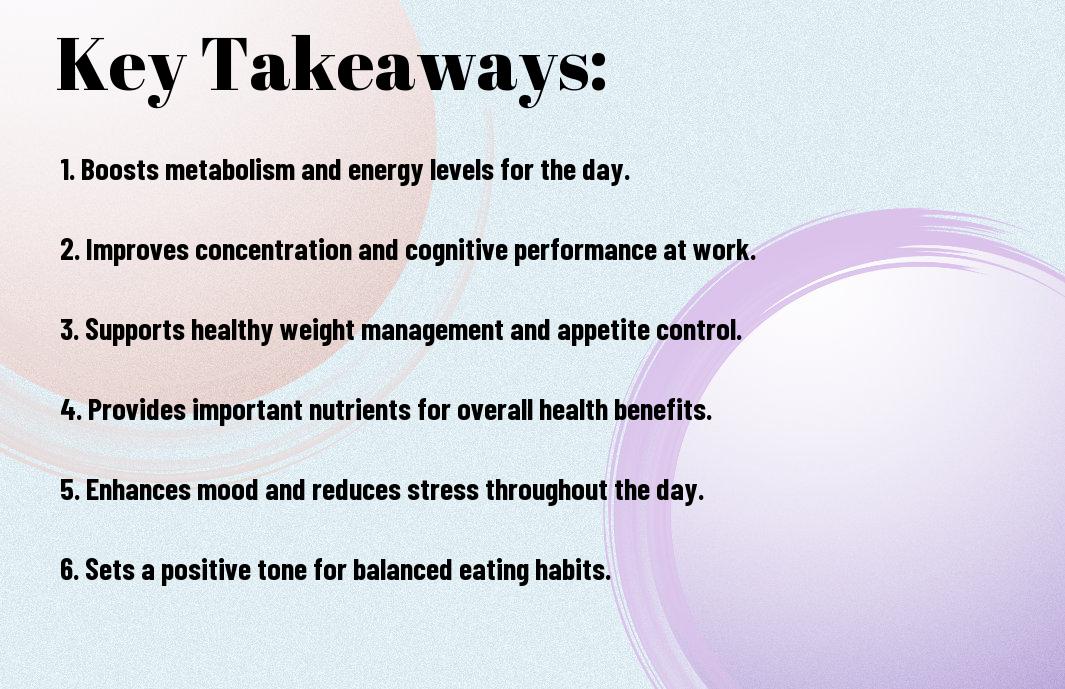Most nutritionists agree that breakfast is the foundation for a productive day. This meal helps boost your energy levels, improves concentration, and sets the tone for healthier eating choices throughout the day. By nourishing your body with a balanced breakfast, you not only provide vital nutrients but also kickstart your metabolism. Understanding the benefits of starting your day with a wholesome meal can transform your daily routine and enhance your overall well-being.
Key Takeaways:
- Energy Boost: Breakfast provides the body with necessary fuel after an overnight fast, enhancing energy levels for the day ahead.
- Cognitive Function: Eating a nutritious breakfast improves concentration, memory, and overall mental performance, particularly for students and professionals.
- Metabolism Regulation: A healthy breakfast kick-starts the metabolism, promoting better weight management and reducing the likelihood of overeating later in the day.
- Nutritional Intake: Breakfast is an opportunity to consume imperative nutrients such as fiber, vitamins, and minerals, contributing to overall health and well-being.
- Long-Term Health: Regularly eating breakfast is linked to a lower risk of certain health issues, including heart disease and diabetes.
The Nutritional Importance of Breakfast
For many, breakfast serves as an vital foundation for the day ahead. It provides the necessary nutrients to fuel your body and brain, setting the stage for better performance and improved productivity. Skipping this important meal may lead to insufficient intake of vitamins and minerals, leaving you feeling fatigued and unfocused. Prioritizing a nourishing breakfast is vital for optimal health and well-being, ensuring that you start your day on the right foot.
Essential Nutrients for Energy
At breakfast, you should aim to include a variety of vital nutrients that promote vitality. Foods rich in proteins, healthy fats, and complex carbohydrates provide a balanced source of energy, helping you maintain stamina throughout the day. Additionally, incorporating fruits and vegetables ensures you receive important vitamins and minerals, which play a significant role in your overall health and wellness.
Impact on Metabolism
Any meal that you consume after an overnight fast triggers your metabolism, making breakfast an important player in weight management. Eating in the morning can kickstart your body’s calorie-burning processes, helping you use energy more efficiently throughout your day.
With a well-balanced breakfast, you stimulate your metabolic rate, allowing your body to process nutrients effectively. Starting your day with a meal sends a signal to your body that it’s time to start burning calories. This can prevent overeating later in the day, keeping your appetite in check. By prioritizing breakfast, you set in motion positive metabolic changes that can support weight control and overall health.
Breakfast and Cognitive Function
While many people rush through their mornings without a proper breakfast, starting your day with a nutritious meal can significantly boost your cognitive function. Your brain requires energy to perform optimally, and breakfast provides the necessary fuel. By eating breakfast, you’re equipping yourself to think clearly, make decisions, and solve problems effectively throughout the day.
Enhancing Concentration and Memory
With a balanced breakfast, you can enhance your concentration and memory. Studies show that consuming foods rich in carbohydrates, proteins, and healthy fats can lead to improved cognitive performance. This means that when you prioritize breakfast, you set yourself up for a day filled with better focus and retention of information.
The Role of Breakfast in Academic Performance
Function plays a significant role in how breakfast impacts your academic performance. Students who eat breakfast regularly tend to have better grades and higher levels of achievement overall. By nourishing your mind and body in the morning, you can engage more effectively in classes, participate in discussions, and retain information for tests.
It is evident that individuals who consume breakfast regularly show improved attention and retention, resulting in better academic outcomes. A well-rounded breakfast can help stabilize blood sugar levels, leading to increased energy and motivation to learn. By making breakfast a priority, you position yourself to excel in your studies and tackle challenging materials with confidence and clarity.
Breakfast and Weight Management
Many studies indicate that eating breakfast can play a significant role in weight management. When you consume a nutritious breakfast, you help regulate your appetite throughout the day, making it less likely for you to overeat at subsequent meals. This practice not only sets a positive tone for healthy eating but also supports metabolic processes that can aid in maintaining a healthy weight over time.
Breakfast Skippers vs. Eaters
Across various studies, individuals who skip breakfast often find themselves struggling with weight management compared to those who make it a habit. Breakfast eaters tend to have better control over their hunger levels and are more likely to make healthier food choices later in the day. By fueling your body in the morning, you set a foundation for balanced nutrition throughout your day.
Long-term Effects on Weight Control
Weight management is significantly influenced by your breakfast habits. Studies show that consistently eating breakfast can lead to better weight control in the long run. Regular breakfast consumption is often linked to healthier body composition, improved metabolic rates, and reduced likelihood of obesity.
Skippers often face a cycle of energy crashes, leading to cravings and potential overeating. Not eating in the morning can prompt you to reach for high-calorie snacks later, making it harder to maintain balanced nutrition. By choosing to eat breakfast, you foster healthier eating patterns that benefit your overall weight management efforts and contribute to long-term wellness.
Psychological Benefits of Eating Breakfast
Keep in mind that eating breakfast can positively influence your psychological well-being. Starting your day with a nutritious meal helps stabilize energy levels, making it easier for you to focus and maintain productivity throughout the morning. Regular breakfast consumption can also decrease feelings of stress and anxiety, allowing you to approach your day with a clearer mindset.
Mood and Mental Health
One of the key benefits of breakfast is its ability to enhance your mood. Studies suggest that individuals who eat a balanced breakfast are less likely to experience mood swings and irritability throughout the day. Nutrients like carbohydrates and proteins help regulate neurotransmitters in your brain, thereby promoting feelings of well-being and reducing instances of depression.
Social Aspects of Breakfast
Among the many benefits of breakfast, the social aspects cannot be overlooked. Sharing a meal in the morning with family or friends fosters connections and enhances your overall sense of belonging. Breakfast gatherings can serve as a special time for conversation and bonding, creating lasting memories and deepening relationships.
Eating breakfast together can turn your meal into a social event where you not only nourish your body but also nurture your social connections. This communal act sets a positive tone for the day and provides an opportunity for open discussions, laughter, and shared experiences. Whether it’s a quick bite with family or a leisurely brunch with friends, the social dimension of breakfast adds richness to your daily routine, reinforcing bonds that contribute to your emotional health.
Common Misconceptions about Breakfast
Now, many people harbor misconceptions about breakfast that can lead to poor dietary habits. One of the most prevalent beliefs is that skipping this vital meal won’t significantly affect your day. However, understanding the facts behind these myths can help you prioritize this important meal and harness its benefits for your overall health and well-being.
The Myth of Skipping Breakfast
The idea that skipping breakfast is not harmful is misleading. Numerous studies indicate that those who eat breakfast tend to have better energy levels, improved concentration, and healthier eating habits throughout the day. Neglecting this meal can lead to overeating later on, which may ultimately hinder your weight management efforts.
Misunderstanding Meal Timing
Meal timing plays an important role in how your body functions, especially when it comes to breakfast. Eating a nutritious breakfast sets the tone for your day and supports your metabolism, energy levels, and cognitive function.
It’s important to understand that your body has a natural rhythm influenced by meal timing. Eating breakfast within a few hours of waking helps restore glucose levels and kickstarts your metabolism for the day. This can improve your alertness and help you make healthier food choices later on. By establishing a consistent breakfast routine, you can enhance your overall health and productivity.
Practical Tips for a Healthy Breakfast
Despite the hectic mornings you may experience, incorporating a nutritious breakfast into your routine can be easy. Here are some tips to ensure you start your day right:
- Include whole grains, fruits, and proteins.
- Prepare simple recipes that require minimal cooking.
- Avoid sugary cereals and pastries.
- Stay hydrated with water or herbal tea.
Any effort you put into your breakfast will contribute to your health. For more insights, check out Is breakfast really the most important meal of the day?.
Quick and Nutritious Options
On busy mornings, choosing quick and nutritious breakfast options can streamline your day. Consider overnight oats, smoothies packed with veggies, or yogurt topped with fresh fruit and nuts. These options provide crucial nutrients without taking too much time to prepare.
Planning Ahead for Success
Along with quick options, advance planning can significantly improve your breakfast experience. By prepping your ingredients or meals the night before, you save time and enhance the likelihood of enjoying a healthy start.
The key to planning ahead is to dedicate a few minutes each week to decide what to eat. Prepare items like smoothie packs, overnight oats, or boiled eggs that can be easily grabbed during busy mornings. Having these items ready ensures you’ll nourish your body efficiently, keeping your breakfast routine consistent and enjoyable.
Final Words
Conclusively, prioritizing breakfast can significantly enhance your daily performance and overall well-being. By providing your body with vital nutrients and energy, you set a positive tone for the day ahead. A balanced breakfast can improve cognitive function, stabilize your mood, and aid in maintaining a healthy weight. When you fuel yourself properly in the morning, you empower yourself to meet challenges and make better food choices throughout the day. Embrace breakfast as a vital part of your routine and enjoy the numerous benefits it brings.
Q: Why is breakfast often considered the most important meal of the day?
A: Breakfast is viewed as the most important meal of the day because it provides the body with necessary nutrients and energy after an overnight fast. Eating breakfast helps kickstart metabolism, which can boost energy levels and improve concentration and productivity throughout the day. It also sets a positive tone for healthier eating habits later on.
Q: What are the benefits of eating a healthy breakfast?
A: Consuming a nutritious breakfast can lead to numerous benefits, such as improved cognitive function and better academic performance in children. Adults may experience enhanced focus, memory, and mood. Additionally, a balanced breakfast can help maintain a stable blood sugar level and manage appetite, potentially reducing the likelihood of overeating later in the day.
Q: What types of foods should be included in a healthy breakfast?
A: A healthy breakfast should ideally include a combination of macronutrients: protein, healthy fats, and complex carbohydrates. Foods such as whole grains (like oatmeal or whole-grain bread), fruits, vegetables, yogurt, and eggs are excellent choices. Incorporating a variety of these foods can provide the necessary vitamins and minerals your body needs to function optimally during the day.


